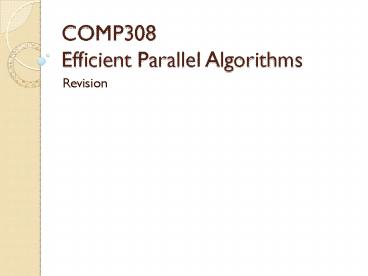COMP308 Efficient Parallel Algorithms - PowerPoint PPT Presentation
Title:
COMP308 Efficient Parallel Algorithms
Description:
Parallel construction of Euler cycles. 5. Sorting algorithms. Mesh ... You need to be able to construct sorting networks. 6. Parallel Virtual Machine (PVM) ... – PowerPoint PPT presentation
Number of Views:56
Avg rating:3.0/5.0
Title: COMP308 Efficient Parallel Algorithms
1
COMP308Efficient Parallel Algorithms
- Revision
2
COMP 308 Exam
- Time allowed 2.5 hours
- Answer four questions (out of five).
- If you attempt to answer more questions than the
required number of questions, the marks awarded
for the excess questions will be discarded
(starting with your lowest mark). - In each question you will see 3 problems which
usually marked as 10,10 and 5
3
Topics
- Sorting Networks
- Communication algorithms
- Parallel Virtual Machine
- Unconventional models and paradigms
- Metrics
- PRAM model
- PRAM algorithms
- Tree algorithms
- Graph algorithms
- Mesh connected networks Sorting
4
1. Metrics and basic notions
Sp p
- Parallel time
- Cost
- Efficiency,
- Speed-up,
- Bounds (Amdahl Law)
- --------------------------------------------------
---- - Complexity Classes NC, P
- Tractable and intractable problems for parallel
computers (P-complete problems)
Efficiency
T1 Tp
S( p)
Cost p ? Tp
Upper bound on speedup
5
Basics of parallel computing
- Coarse and fine grained computations
- Models
- PRAM model
- EREW, CRCW, CREW, ERCW
- MIMD, SISD, SIMD, MISD
- Network topologies
- Ring, Mesh, Tree, Hypercube
6
2. PRAM algorithms
- Activation of n processors
- Finding minimum of n numbers
- Sum of elements in an array
- Computing of the first 1 in the sequence of 0s
and 1s - Simulation of CRCW algorithm by EREW model
7
3. Basic parallel techniques
- Balanced binary tree technique
- Doubling technique
- Parallel divide and conquer
- The Euler-tour technique
8
4. Tree and Graph algorithms
- List ranking problem
- Parallel prefix sum computation
- Parallel algorithms for expression evaluation
- Simultaneous Substitutions Method
- A parallel pebble game
- Parallel Computation of Transitive Closure
Problem (Warshall algorithm) - Coarse grained vs. Fine grained
- Parallel construction of Euler cycles.
9
5. Sorting algorithms
- Mesh connected networks.
- Sorting on 1-dim mesh
- Sorting on 2-dim mesh
- Comparison networks
- The zero-one principle
- Bitonic and Merging sorting networks
- Batchers merging network
- You need to be able to construct sorting networks
10
6. Parallel Virtual Machine (PVM)
- Basics of Message-Passing Programming
- Broadcast
- Scatter
- Gather
- Reduce
11
7. Communication operations
- Store and forward routing
- Cut-through routing
- Broadcasting problem
- Broadcast on ring
- Broadcast on mesh
- Broadcast on tree
- Broadcast on hypercube
- Gossiping problem
12
Unconventional models and paradigms
- Cellular automaton
- Majority problem Rule 184
- Simulation with 2D environment
- Swarm algorithms
- Swarming Characteristics
- Culture model and Adaptive Culture model
- Membrane computing P-systems
- Basic definition,
- Maximal parallelism in membrane computation model
- Square function and divisibility
- DNA computing
- Adleman Experiment Hamiltonian Path Problem
- Quantum computations
- Deutsch's problem. Main ideas of quantum
computations, quantum information.































